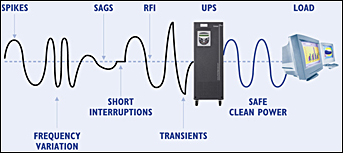UPS Technologies Explained

A UPS (Uninterruptible Power Supply) is a power protection system to provide clean, stable power to critical application equipment during power disturbances and power failure.
There are most commonly Nine Power Problems, namely Power Failure, Power Sag, Power Surge, Over-Voltage, Under-Voltage, Electrical Line Noise, Frequency variation, Switching Transient(Notch) and Harmonic distortion that may affect your critical systems.
Depending upon your power protection requirement, you can select from different types of Uninterruptible Power Supply (UPS) systems that will shield your critical data and equipment from some or all of the 9 power problems.
UPS Technologies Explained
- Offline UPS
- Double Conversion Online UPS
Offline UPS
Basic solution for non-critical applications It filters the power from your mains outlet to your devices. These units will transfer to the battery backup when the voltage from the mains drops below the normal level (commonly called a sag or brownout) or increases beyond the normal level (surge). The inverter is “off” until needed to convert the battery power into useful electricity. Offline UPS are usually the least expensive as compared to the other two. It is a basic solution that protects non-critical hardware and data against three out of the nine power problems. These UPSs operate in Offline mode. The Off-line UPS provides protection against:- Utility blackouts
- Limited high voltage transients
- Output voltage drop-outs during transfers to battery
Online UPS
Full power protection of critical applications These UPS provides the highest level of power output and voltage regulation. The system continuously rectifies all of the electricity from the mains to DC and then uses the inverter to recreate the AC power for the load. Since the inverter is “on” all the time, there is no transfer time to battery during a power failure. An online system is especially useful for sensitive and critical equipment/devices. Online UPS are Generator Compatible. It provides full power protection of critical applications, day and night. These double-conversion UPSs with excellent connectivity and communication features provide full protection against all nine types of power problems. Most of them can run in parallel, thus providing 100% uptime in the most critical of applications. Understanding Online UPS Technology The online UPS, sometimes called a true UPS, is the best type you can buy. Paradoxically, it is both very similar to, and totally opposite to, the least-expensive type, the Offline UPS. It is very similar to it in that it has the same two power sources, and a transfer switch that selects between them. It is the exact opposite from the Offline UPS because it has reversed its sources: in the online UPS the primary power source is the UPS’s battery, and utility power is the secondary power source. Of course, while seeming small, this change is a very significant one. Under normal operation the online UPS is always running off the battery, using its inverter, while the line power runs the battery charger. For this reason, this type of UPS is sometimes also called a double-conversion or double-conversion online UPS. This design means that there is no transfer time in the event of a power failure–if the power goes out, the inverter (and its load) keeps chugging along and only the battery charger fails. A computer powered by an online UPS responds to a power failure in the same way that a plugged-in laptop PC does: it keeps running without interruption, and all that happens is that the battery starts to run down because there is no line power to charge it. There is another key advantage to having the equipment running off the battery most of the time: the double-conversion process totally isolates the output power from the input power. Any nasty surprises coming from the wall affect only the battery charger, and not the output loads.What will a UPS do?
Power disturbances and blackouts can be costly. Preserving information, the availability of equipment critical to the business, maintaining fully occupied staff, performing reliably and getting results on time are all key elements in any successful operation.
A UPS will help:
- Protect against risk of permanent information loss
- Prevent the inconvenience of down-time and loss of system use
- Minimize direct sales revenue losses
- Prevent physical damage to user equipment
- Reduce staff inactivity
- Overcome the need for system software rebuild
- Prevent over-run of deadlines
Who needs a UPS?
All business operations use some form of equipment that relies heavily on electric power, and therefore should have a power protection strategy in place. The following all require UPS:
COMPUTERS:
- General Office Data Processing
- Engineering, Architectural, Planning
- Graphic Design, Advertising, Publishing
- Industry related Client Data Management
- (Travel, Realty, Pharmaceutical) Retail Point of Sale Control
- Research and Development Programs
- Medical, Hospitals
COMMUNICATIONS:
- Satellite Communications
- Telecom, Key Systems, EPABX
- Broadcasting, Television, Radio
- Facsimile machines
SECURITY:
- Building Systems / Premises monitoring
- Fire Alarm Systems
PROCESS CONTROL:
- Automated Manufacturing Systems
- Quality Control Systems
- Production-line Monitoring
- Electronic Variable Speed Devices
MEDICAL & HEALTH:
- Operating Theatre
- Life support Systems
- Diagnostic Equipment
BANKING & INSURANCE:
- Teller Support
- Bank Data Communication
- Ledger Access
- Client Information Hot-lines
- Automatic Teller Machines
MILITARY:
- Defence Applications